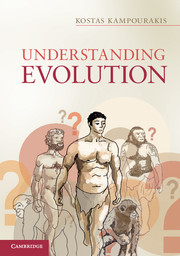Book contents
5 - Common ancestry
Published online by Cambridge University Press: 05 June 2014
Summary
In the previous chapter I described the development of Darwin’s theory, which established the foundations of modern evolutionary theory. It was explained that Darwin’s theory was in particular ways incomplete because, for instance, there was no evidence that natural selection could indeed produce new species from pre-existing ones. As discussed in the previous chapter, this raised important criticisms, from both proponents and opponents. However, the major arguments in the Origin were sound and pointed to two important scientific facts: (1) that all organisms living on Earth are related through descent from common ancestors, thus forming a tree (or rather, as I describe later, a network) of life, and (2) that all organisms living on Earth evolve through natural processes (often, but not exclusively, through natural selection) and in doing so species may persist, evolve to new ones, or die out. Despite the advancements in evolutionary biology in the more than 150 years since the publication of the Origin, Darwin’s description of evolution as descent with modification remains at the core of contemporary evolutionary theory. These two ideas, common descent and evolutionary change through modification of extant species, will be the focus of this and the next chapter, respectively. Let us start with the idea of common descent. In Chapter 3 I argued that organisms are not designed in the way artifacts are. So, contrary to artifacts, we have to look for the origin of species in pre-existing ones, and should not postulate any intentional plan behind that. All species have evolved through natural processes, and the outcome is that both extinct and extant species are more or less related. Actually, time matters and so two species usually are more similar the more recent their common ancestor is. Does this necessarily imply that there must be some universal common ancestor(s) from which all life evolved? Yes, it does.
- Type
- Chapter
- Information
- Understanding Evolution , pp. 127 - 168Publisher: Cambridge University PressPrint publication year: 2014



